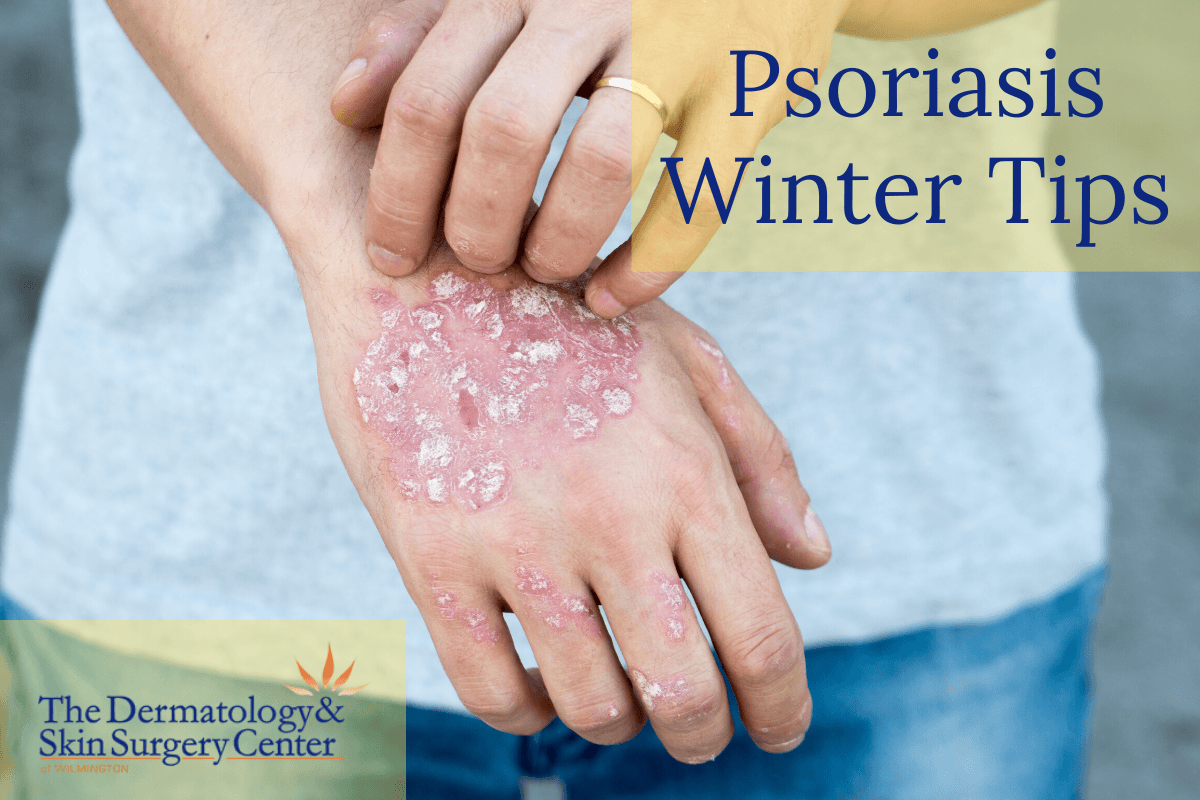At The Dermatology & Skin Surgery Center of Wilmington, we understand how hard it can…

7 Must-Know Tips on Managing Your Psoriasis This Winter
Dry air, chilly temps, windy weather, and lack of sunshine can bring on uncomfortable skin conditions, like dry and cracked hands, to anyone. But for people with psoriasis, this time of the year can be especially difficult.
The changes in weather conditions combined with less sun exposure and the holidays spur psoriasis flare-ups and further amplifies painful psoriasis symptoms. To help you manage your psoriasis this winter and have a happier holiday season, follow our expert cold weather tips to keep your psoriasis in check.
Tips for Managing Psoriasis in Winter
Don’t Take Long, Hot Showers
Instead, opt for shorter, lukewarm showers or warm, restorative baths. Taking lukewarm baths or showers can calm the nerves, soothe the skin, reduce irritation, and decrease inflammation and swelling. Hot showers (and hot baths) strip the skin of its natural, protective oils and draw out moisture to leave you with dry, scaly skin.
One of our favorite ways to help patients with psoriasis is recommending a lukewarm bath with finely ground oatmeal and Epsom salts sprinkled in to soften the skin and alleviate irritation.
Do Add Moisture to the Air
Winter is the best time to utilize a humidifier to add moisture to the air. Not only is the cold, outdoor air unforgiving to psoriasis-prone skin, but heating units also dry out the air and reduce humidity indoors, which can make your skin dry, flakey, and itchy.
Using a humidifier is a great way to replace moisture inside your home or workspace to combat dry, cracked skin.
Don’t Under Moisturize Your Psoriasis
Keeping your skin moisturized is key to reducing psoriasis flare-ups, as this skin condition is characterized by extreme skin dryness. Making sure the skin stays hydrated eases any itchiness, reduces redness, and heals psoriasis patches.
We recommend trying thicker creams and lotions this winter season to better lock in moisture and hydrate the skin. Additionally, try sticking your lotions and moisturizes in the refrigerator to enhance their cooling and skin-calming benefits!
Do Manage Stress
No doubt, the holidays can be a joyful time that brings loved ones together, but it can also be a stressful time that triggers psoriasis flare-ups.
Not to mention, many people experience SAD (seasonal affective disorder) during the colder, darker months, which can bring on feelings of sadness and depression. All of these together further aggravate psoriasis, which is why it’s crucial to adopt a few stress-management techniques, like yoga, meditation, or regular exercise.
Don’t Wear the Wrong Clothing
Wearing appropriate clothing in colder temperatures is a top tip to better manage your psoriasis in the winter. Keep the skin protected by choosing breathable, lightweight materials that are easy to layer on and take off if you get sweaty (which can dry on the skin and worsen psoriasis). Utilize soft scarves, heavy hats, and thick gloves to cover exposed areas when outdoors.
Additionally, avoid materials such as wool and denim, which can bother the skin and further irritate psoriasis patches.
Do Drink Lots of Water and Eat Healthily
When your entire body is dehydrated, your skin is dehydrated. This is why it’s important to drink lots of water in the winter to keep skin moisturized — even if you might not feel thirsty!
Try to drink enough water to turn your urine a pale yellow color; if it’s too dark or vibrant yellow, you’re likely not hydrated enough!
Additionally, eat a healthy, well-balanced diet to reduce inflammation and provide your body with ample vitamins and nutrients.
Don’t Skip Out on Reevaluating Your Psoriasis Treatment Plan
If you feel like your psoriasis is getting worse with every new fall and winter season that rolls around, it might be time to visit a board-certified dermatologist to reevaluate your psoriasis treatment plan.
Improving your psoriasis might only require a few small changes, like a different topical treatment or the implementation of a little light therapy.
In conclusion, with these 7 dos and don’ts, you can better manage your psoriasis this winter to have a more comfortable time in the cold weather and holiday season!
Contact the Dermatology and Skin Surgery Center of Wilmington for all of your psoriasis and general dermatology needs, as well as Mohs surgery and cosmetic treatments. Since 2001, Skin Surgery Center’s fellowship-trained Mohs surgeons and board-certified dermatologists have provided patients with exceptional treatment outcomes. Our professional staff is ready to provide you with the thoughtful, competent care that you deserve in our state-of-the-art facilities. Book your appointment today.



